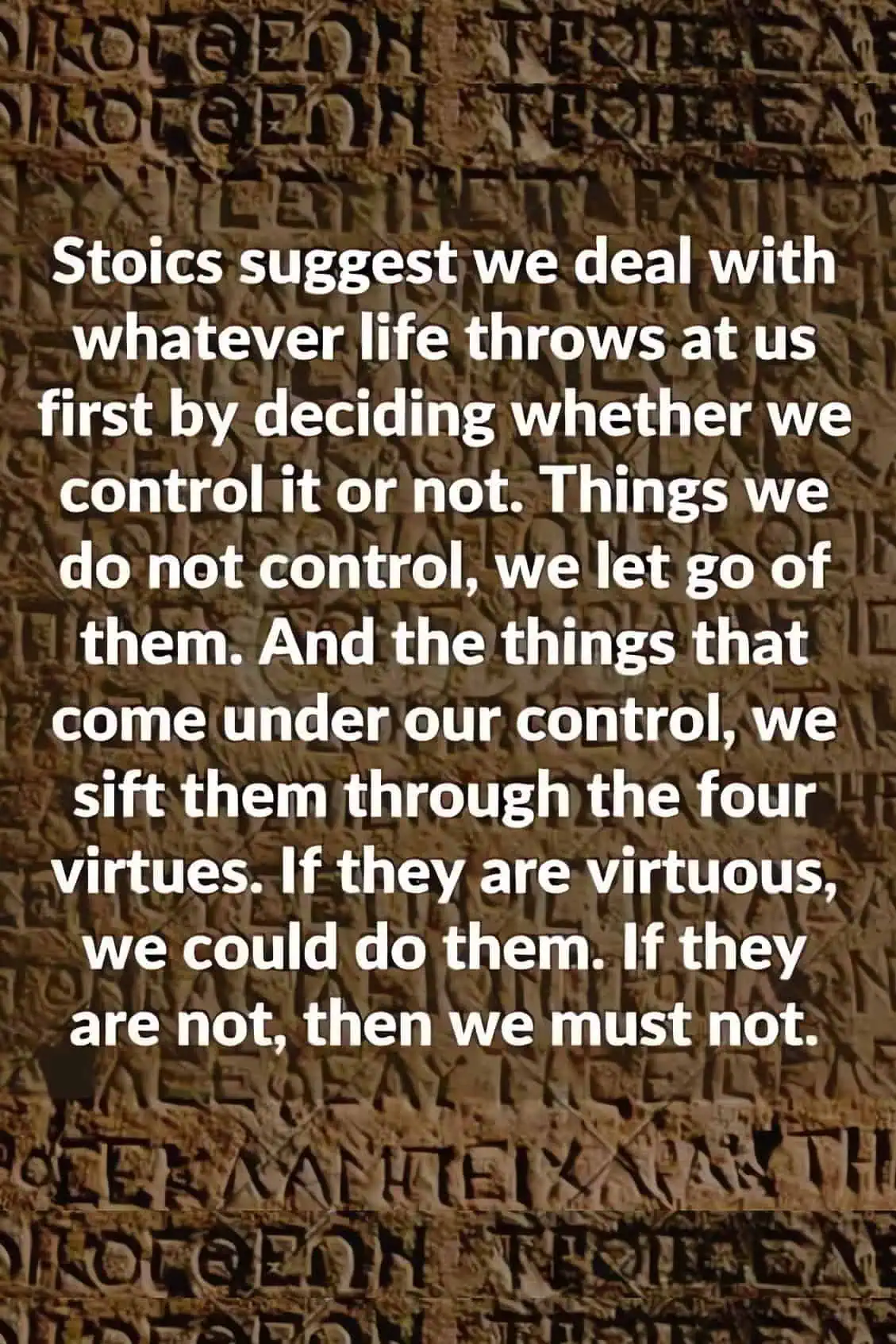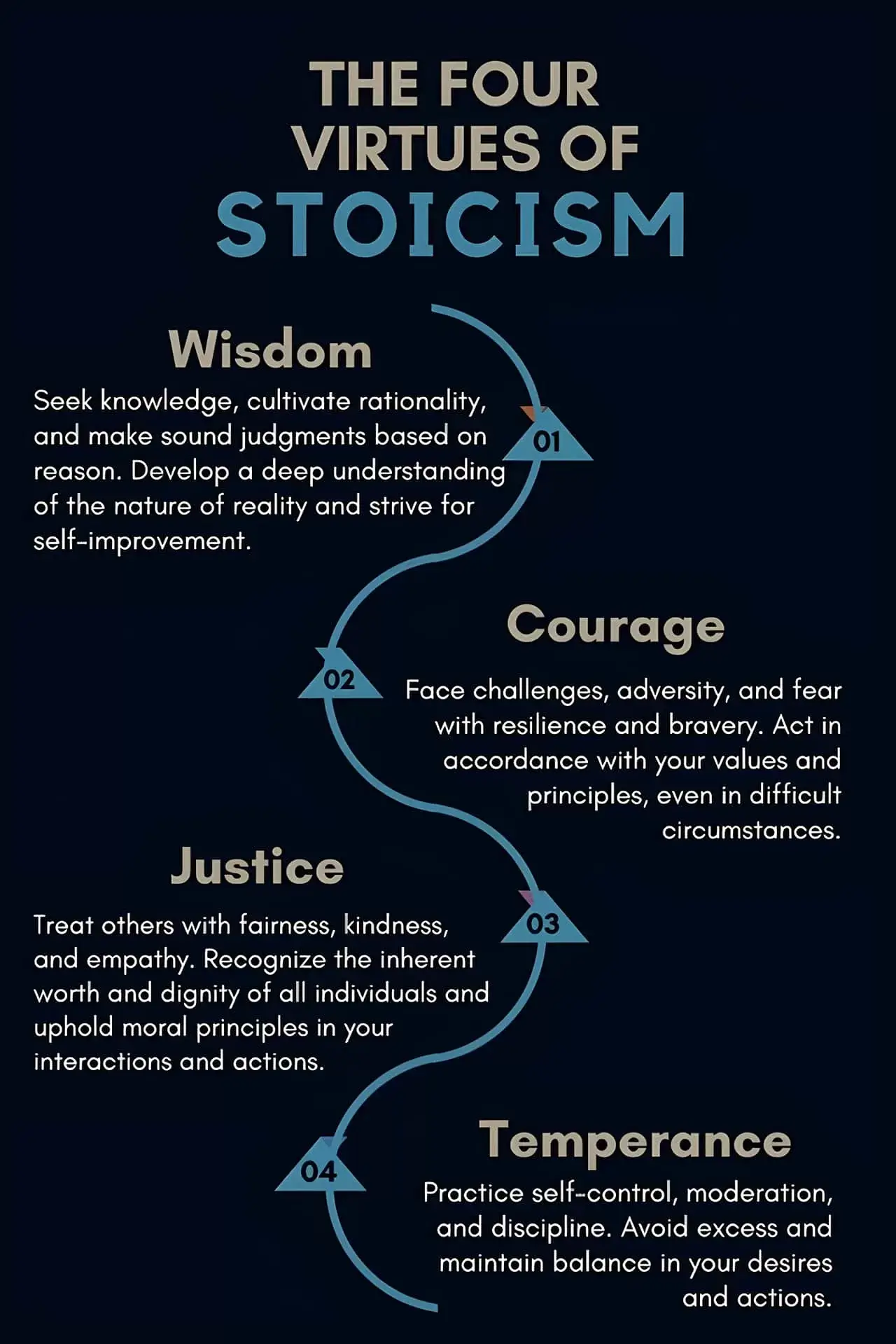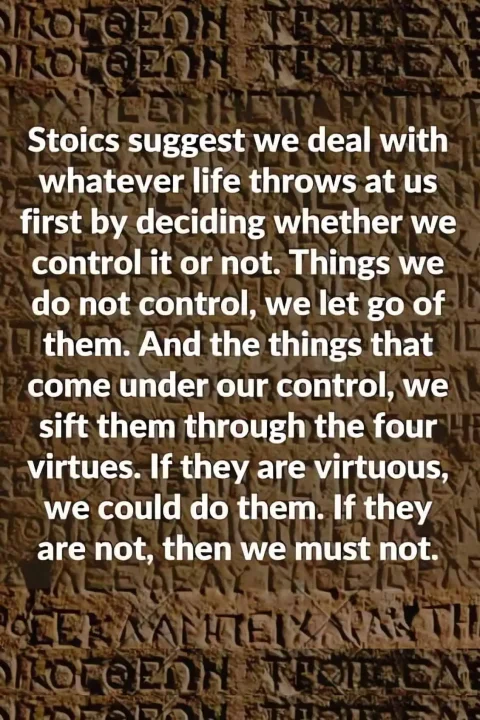Today's Thursday • 7 mins read
— Reviewed by Dr. Sandip Roy.
As adults, we make around 35,000 decisions in a day; in contrast, a child makes about 3,000 (Sahakian & Labuzetta, 2013). That is one choice every two seconds.
Most of these are simple and easy, like what dress to wear to the office today.
But making decisions uses our mental energy and causes decision fatigue, which worsens the quality of our decisions.
This might be why Steve Jobs wore the same black turtleneck and blue jeans every day. And Mark Zuckerberg, until sometime back, wore the same gray T-shirt to work.
Peter Drucker says, “Making good decisions is a crucial skill at every level.” And good decisions mean choosing the best option now that will solve future challenges.
Stoics make decisions in a way that they do not regret or worry about making a wrong decision. How could we use the Stoic way to make better decisions in life?
Let’s dive in to understand it better.

How The Stoics Decide Quickly And Rightly
Stoic philosophy trains one to think clearly, decide quickly, and regret rarely.
Here are the 4 steps to make a quick decision, like a Stoic:
- First, decide if the situation you are facing is under your control or not.
- Second, if it is not under your control, leave it there and stop overthinking it or worrying about it.
- Third, if there is some element in it that you can control, sieve it through the four cardinal virtues.
- Finally, if it passes the virtue test (more on it later), do it. If it does not pass the virtue test, then do not do it.
The core purpose of Stoicism for 2,300 years has been to help people find “apatheia”—a balanced state of mind—while living a life of challenges and obstacles. Translated, apatheia means “without passions,”—not without emotions (which is apathy, an English word borrowed from the same Greek word).
The Stoic calmness or apatheia comes from pruning off the wild branches from their decision tree. So they can make hard choices while remaining unruffled.

A Modern Stoic Decision Maker: Elon Musk
Elon Musk is a (somewhat flawed) example of a modern Stoic — he clearly lacks the virtue of moderation when it comes to the words he lets out into the world.
But Musk can remain calm and focused when faced with giant failures and impossible challenges in his work.
When Tesla was facing production issues and financial troubles a few years ago, Musk kept focusing on what was within his control — the manufacturing processes, cost-cutting measures, and pushing his team to work harder.
Similarly, when SpaceX experienced multiple rocket failures early on, Musk did not dwell on setbacks that were outside his control. He made decisions to keep the company moving forward.
He said, “It is important for us to die because … If you live forever, we might become a very ossified society where new ideas cannot succeed.”
Musk’s ability to prune off the “wild branches” of his decision tree and make tough choices going forward embodies the Stoic ideas of “memento mori and amor fati.”
“Some things are within our power, while others are not. Within our power are opinion, motivation, desire, aversion, and, in a word, whatever is of our own doing; not within our power are our body, our property, reputation, office, and, in a word, whatever is not of our own doing.”
— Epictetus, Enchiridion 1
How To Perform “The Virtue Test”
When you have a plan of action that you can control, use the virtue test. That is, run your potential action through the lens of virtue.
Since the Stoics classify Virtue into four cardinal virtues, this is what you must ask yourself:
- Wisdom: practical wisdom applied to situations. Ask yourself, is my action wise?
- Justice: reason and judgment applied to social interactions. Ask yourself, is my action just?
- Temperance: moderation and avoidance applied to indulgence. Ask, is my action temperate?
- Courage: grit and resilience applied to difficult circumstances. Ask, is my action courageous?
If your plan of action:
- Passes the virtue test, go ahead and do it.
- Has no virtue, then decide if it is indifferent.
- If it is a preferred indifferent—life, health, pleasure, beauty, strength, well-functioning sense organs, wealth, reputation—you could do it.
- If it is a dispreferred indifferent—death, disease, pain, ugliness, frailty, disablement, poverty, low repute, and ignoble birth—then you should avoid it.
- Is a vice—the opposite of virtue—harmful to self or others, or against Nature, then never do it.
Professor Massimo Pigliucci writes,
“Your duty as a Stoic is to do whatever allows you to practice the four cardinal virtues of — wisdom (the ability to determine the best course of action under difficult circumstances), justice (the most obviously socially-oriented of the Stoic virtues), temperance (the most inward-looking, concerned with controlling your own excesses), and courage (which does not have to be, and indeed often is not, just physical, but more broadly the determination to do the right thing).”
Stoic Beliefs Behind Decision-Making
The Control
Stoics believe that all events in the universe are predetermined. And we have no power to control the course of events.
Since we cannot control external circumstances, we are better off trying to control our own thoughts, opinions, feelings, and actions.
The Reason
Stoics define Reason as a mental dialogue or “internal speech” — the ability to see and consider an issue from a 360-degree perspective. They believe it is human nature to Reason.
- All virtues spring from Reason. So, as Seneca asserts, virtuous acts are the most rational (reasonable) acts in every situation.
- Seneca also says that all acts of virtue are equally good, whatever the circumstance. This is because virtue comes from Reason and what is rational can only be virtuous, no more and no less.
- To act with Reason is also the way Nature intends it to be. And since Nature is ruled by the divine “logos,” what is natural is perfect. So, to act out of reason is to act with perfection and in harmony with nature.
Zeno, the founder of Stoicism, said:
“The single plan by which life should be lived must be a plan formed by correct reason, and this would be one that is natural in the sense that it accords both with man’s nature and with universal nature.”
The Virtue
For a Stoic, virtue is a way of life — to feel, think, desire, choose, and act — based on goodness.
A virtuous person will always act morally and ethically, whether anyone is watching or not.
Decision Fatigue
Decision fatigue is also known as ego depletion or willpower depletion by experts. Making too many decisions can cause decision fatigue.
Some facts on it:
- Highly stressed people get decision fatigue earlier and more often.
- People with decision fatigue also feel less guilty about their actions and are less helpful to others.
- Decision fatigue can lead to worse decisions at the day’s end than those made at the day’s start or after a break.
“Decision fatigue helps explain why ordinarily sensible people get angry at colleagues and families, splurge on clothes, buy junk food at the supermarket and can’t resist the dealer’s offer to rustproof their new car. No matter how rational and high-minded you try to be, you can’t make decision after decision without paying a biological price. It’s different from ordinary physical fatigue — you’re not consciously aware of being tired — but you’re low on mental energy.”
— John Tierney & Roy Baumeister, Willpower: Rediscovering the Greatest Human Strength
Final Words
The gist of the Stoic way of decision-making is this:
Decide what parts of the event you can control. The things you can’t control, let them go. The things you can control, sift them through the four cardinal virtues. If virtuous, do them. If not, then do not.
- Stoics are perpetual learners.
- They know they will fail at their many attempts to achieve their goals.
- They define success in terms of aiming and acting right, not whether they hit the target.
Did you aim right?
√ Also Read: How To Be A Modern Stoic?
√ Please spread the word if you found this helpful.
• Our Story!
» You deserve happiness! Choosing therapy could be your best decision.
...
• Disclosure: Buying via our links earns us a small commission.

